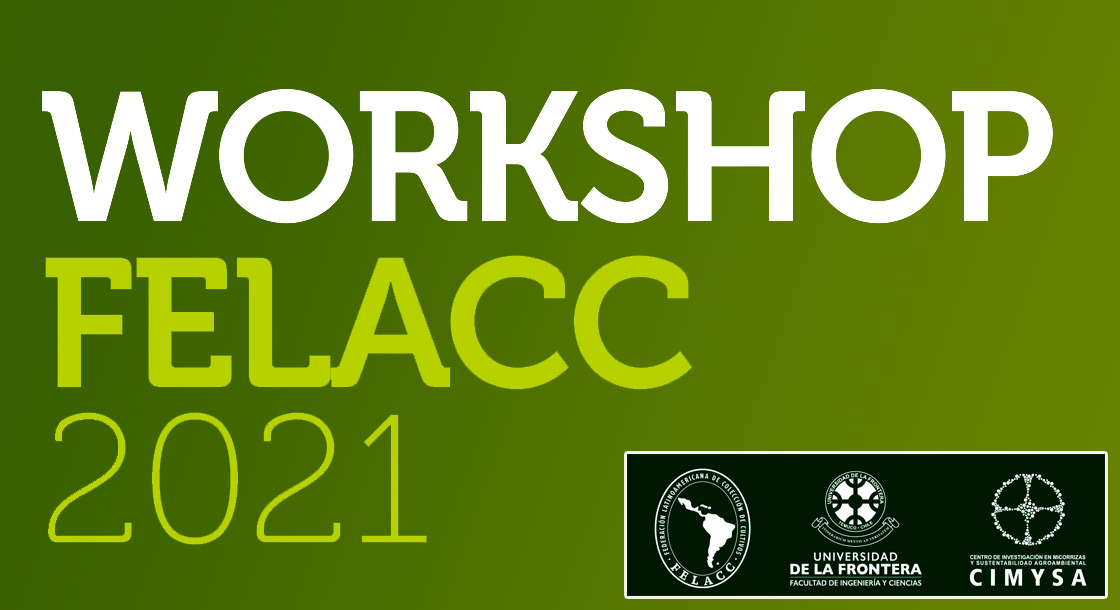As part of an alliance established between the Latin American Federation for Culture Collections and the Faculty of Engineering and Science of the Universidad de La Frontera, an international workshop has been organized that already brought together more than 500 people who are working in the field of microbiology and other related fields.
More than 500 researchers, academics, specialists, students, etc. from different countries participated in the first Module of the Workshop “Ex situ Preservation and Data Management in Collections of Microbial Cultures”, organized by the Latin American Federation for Culture Collections (FELACC) in collaboration with the Faculty of Engineering and Science (FICA) of the university Universidad de La Frontera (UFRO) and with the support of the UFRO Research Center for Mycorrhizae and Agri-environmental Sustainability (CIMYSA).
The online event brings together the international scientific community that is interested in the ex situ preservation of microorganisms (outside their natural habitat) and in data management in the field of collections of microbial cultures. The objective of this event is to strengthen and/or expand the collaborative networks in this field of research.
UFRO-FELACC ALLIANCE
FELACC was created in 2004, as an organization of experts in microbiology, who are interested in the exchange of ideas, knowledge, and information related to the ex-situ preservation of microbial cultures in Latin America and the Caribbean.
Since 2018, Dr. Cledir Santos, an academic of the Faculty of Engineering and Science at UFRO, is part of the FELACC Executive Board. That way, he was able to build valuable networks and to establish a partnership between the Federation and UFRO.
“We do have expertise and know-how in the field of ex situ preservation of microbial resources at the Department of Chemical Sciences and Natural Resources of UFRO, with about 15 years of experience. During that time, we were able to build a solid international network with partners all over the world,” Dr. Santos explains.
In this context, Dr. Santos adds that “UFROs part in the organization of these two Modules of the workshop allows us to show the local, national and international community our work in the field of ex situ preservation and data management in collections of microbial cultures. We are already internationally recognized and that’s not only because of our participation in different international organizations, but especially because of our scientific expertise in this field”.
He also points out that “this has been possible because of the ethical work we have done when it comes to maintaining and preserving the microbiological material and information related to the research and technological development of our peers. In addition, our work has been supported by the scientific expertise of our international peers. Thus, we have been very consistent in our scientific work for the past 15 years.”
WORKSHOP MODULES
This workshop has been organized in different modules and the first two are in Spanish and Portuguese, since FELACC realized that there is a certain need for training in ex situ preservation of microorganisms in Latin America.
“We know that English is a universal language in science and we hope to be able to carry out other similar activities in that language in the near future, so we could invite experts from other parts of the world, too,” Dr. Santos explains.
The first module took place on March 9, with the participation of Latin American and European speakers with solid experience in ex situ preservation and data management in collections of microbial cultures.
IMPRESSIONS
The Dean of the Faculty of Engineering and Science of UFRO, Dr. Rodrigo Navia, believes that it is very important to develop this kind of events for scientific dissemination. He also points out that “it is an honor for us as a faculty to be part of this workshop, because we are very interested in building networks that allow us to raise awareness about the importance of ex situ preservation of microorganisms, and to keep working in this field”.
At the same time, Dr. Juan Carlos Estrada, the President of FELACC, emphasizes that “the recent implementation of distance education all over the world is quite beneficial for the Federation and, in this context, I would like to give a special thanks to the Executive Board, the organizing committee and the Faculty of Engineering and Science of UFRO, for their efforts and commitment, which made this workshop possible”.
The second module is programmed for April 20. If you want to watch the video of the first module, please follow this link: https://www.youtube.com/watch?v=tJm_1AlTn2E
Written by: Daphne Bormann
Faculty of Engineering and Science, UFRO


